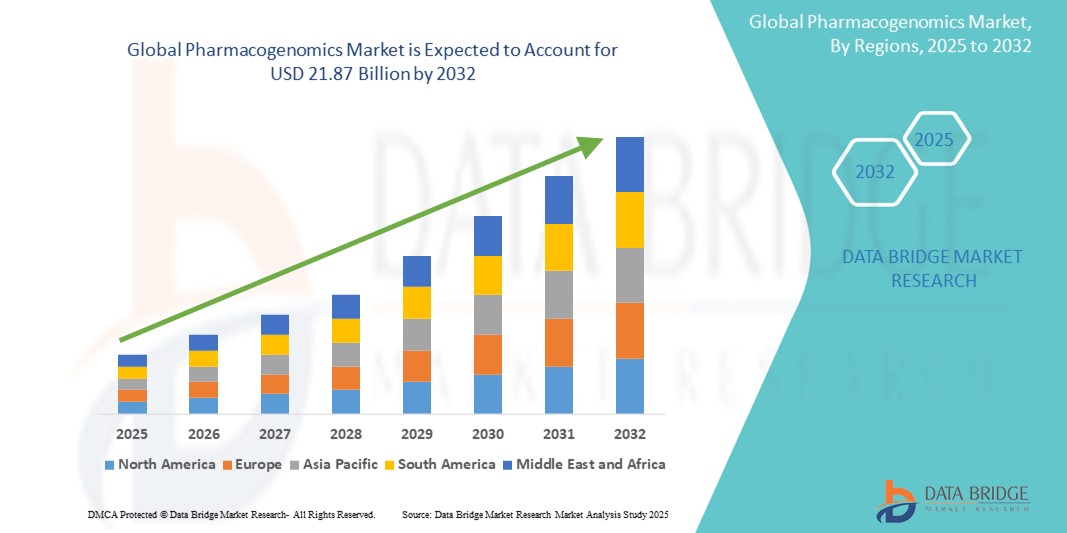Global Pharmacogenomics Market
市场规模(十亿美元)
CAGR :
% 
 USD
9.62 Billion
USD
21.87 Billion
2024
2032
USD
9.62 Billion
USD
21.87 Billion
2024
2032
| 2025 –2032 | |
| USD 9.62 Billion | |
| USD 21.87 Billion | |
|
|
|
|
全球藥物基因組學市場細分,按產品和服務(試劑盒、試劑和服務)、疾病領域(癌症、心血管、神經系統疾病和其他疾病領域)、技術(DNA測序、微陣列、聚合酶鍊式反應、電泳和質譜)、應用(藥物發現、神經病學、腫瘤學、疼痛管理和其他)、最終用戶(醫院、研究機構和其他預測趨勢
藥物基因組學市場規模
- 2024 年全球藥物基因體學市場規模為96.2 億美元 ,預計 到 2032 年將達到 218.7 億美元,預測期內 複合年增長率為 10.8%。
- 市場成長主要得益於基因組定序和精準醫療技術的日益普及和技術進步,這導致藥物開發和臨床實踐的個人化程度不斷提高。藥物基因組學使醫療保健提供者能夠根據個別基因圖譜量身定制治療方案,從而提高藥物療效並降低藥物不良反應的風險,最終改善患者治療效果。
- 此外,消費者對更安全、更有效、更個人化治療方案的需求日益增長,這使得藥物基因組學成為現代精準醫療的基石。這些因素正在加速醫院、研究機構和製藥公司對藥物基因組學解決方案的採用,從而顯著推動該行業的成長軌跡。
藥物基因體學市場分析
- 藥物基因組學研究基因如何影響個人對藥物的反應,由於其在指導個人化醫療策略方面發揮重要作用,在現代醫療保健中變得越來越重要。它使臨床醫生能夠根據基因圖譜優化藥物選擇和劑量,從而顯著提高治療效果並最大限度地減少藥物不良反應。
- 精準醫療的廣泛應用、慢性病和遺傳性疾病的日益流行,以及減少處方試錯的需求,推動了藥物基因組學需求的不斷增長。這促使人們對基因組檢測平台、伴隨診斷以及將藥物基因組學數據整合到電子健康記錄 (EHR) 中的投資不斷增加。
- 北美在藥物基因組學市場佔據主導地位,2024 年其收入份額最高,為 42%,這得益於政府大力推動基因組學研究、醫療保健提供者的高度認知、強大的醫療保健基礎設施以及大型製藥和生物技術公司的存在
- 亞太地區預計將成為藥物基因組學市場成長最快的地區,預計 2025 年至 2032 年的複合年增長率為 12.8%,這得益於醫療保健支出的增加、基因組研究計劃的擴大以及中國、日本和印度等國家越來越多地採用精準醫療實踐
- 腫瘤學領域在藥物基因組學市場佔據主導地位,2024 年的市佔率為 43.2%,這得益於藥物基因組學檢測在客製化癌症治療方案(包括標靶治療和免疫療法)中的廣泛應用。伴隨診斷的持續發展以及個性化腫瘤藥物的監管審批,進一步推動了該領域的成長。
報告範圍和藥物基因組學市場細分
|
屬性 |
藥物基因組學關鍵市場洞察 |
|
涵蓋的領域 |
|
|
覆蓋國家 |
北美洲
歐洲
亞太
中東和非洲
南美洲
|
|
主要市場參與者 |
|
|
市場機會 |
|
|
加值資料資訊集 |
除了對市場價值、成長率、細分、地理覆蓋範圍和主要參與者等市場情景的洞察之外,Data Bridge Market Research 策劃的市場報告還包括深入的專家分析、定價分析、品牌份額分析、消費者調查、人口統計分析、供應鏈分析、價值鏈分析、原材料/消耗品概述、供應商選擇標準、PESTLE 分析、波特分析和監管框架。 |
藥物基因組學市場趨勢
“透過人工智慧驅動的基因組分析提高精度”
- 全球藥物基因組學市場的一個重要且正在加速發展的趨勢是將先進的人工智慧 (AI) 和機器學習 (ML) 融入基因組數據解讀中。這些技術正在顯著提高識別臨床相關基因變異以預測藥物反應的速度和準確性。
- 例如, DeepVariant 和 Strelka2等平台正在利用人工智慧來提高單核苷酸變異檢測的精確度和靈敏度,使臨床醫生能夠根據患者基因組更有效地定製藥物治療
- 人工智慧驅動的分析還能整合真實世界證據和電子健康記錄 (EHR) 數據,從而實現藥物基因組學演算法的動態學習和持續優化。因此,醫療保健提供者可以在為個別患者選擇最佳治療方案時做出即時、基於數據的決策。
- 將人工智慧驅動的藥物基因組學決策支援工具無縫整合到臨床工作流程(例如 EHR 外掛程式和數位處方平台)中,有助於實現集中式即時診療指導。這種統一的介面使臨床醫生能夠存取基於基因型的藥物推薦以及患者治療記錄,從而減少處方錯誤並改善患者預後。
- 這種向更聰明、更自適應、數據驅動的藥物基因組學系統的轉變,正在從根本上改變醫生和患者對個人化治療的期望。因此, 2bPrecise 和 OneOme等生物技術公司正在開發全面的藥物基因組學報告,其中包括藥物-基因對評分、風險分層以及根據臨床醫生工作流程量身定制的互動式給藥建議。
- 隨著醫療保健利益相關者越來越重視治療精準度、病人安全和優化治療效果,醫院、專科診所和門診護理機構對基於無縫 AI 解釋和整合的藥物基因組學解決方案的需求正在迅速增長
藥物基因體學市場動態
司機
“個人化醫療需求的不斷增長以及基因組技術的進步也帶來了日益增長的需求”
- 對個人化醫療的日益重視以及對基因對藥物療效和安全性影響的認識不斷提高,是推動藥物基因組學解決方案需求不斷增長的重要驅動因素
- 例如,2024年3月,Illumina公司推出了基於新一代定序的伴隨診斷測試,旨在優化腫瘤學藥物反應,這標誌著基因組學融入臨床決策的重大進展。預計這些關鍵參與者的進展將在預測期內推動藥物基因組學產業的成長。
- 隨著醫療保健提供者和患者尋求更有效、更個人化的治療策略,藥物基因組學能夠根據個人的基因特徵預測藥物反應和不良反應,從而提高治療效果
- 此外,將基因組數據整合到電子健康記錄 (EHR) 中,並使用人工智慧驅動的決策支援工具,使臨床醫生更容易將藥物基因組學見解納入常規護理
- 基因檢測試劑盒供應量的增加、生物製藥研發投資的增加以及政府推動精準醫療的有利舉措,都是加速醫院、研究中心和診斷實驗室市場採用的額外因素
克制/挑戰
“對資料隱私、解釋複雜性和高測試成本的擔憂”
- 儘管藥物基因組學市場潛力巨大,但它仍面臨關鍵挑戰,尤其是在資料隱私和基因組資料解讀的複雜性方面。基因資訊的敏感性引發了人們對其儲存、共享和濫用的擔憂,尤其是在某些地區缺乏嚴格的監管框架的情況下。
- 例如,未經授權存取基因數據事件或基於基因資訊歧視的擔憂可能會阻止患者接受藥物基因組學測試。
- 此外,解釋藥物基因組學結果需要高度的臨床專業知識和強大的生物資訊支持,而這些可能並非所有醫療機構都能提供,尤其是在資源匱乏的地區
- 23andMe 和 GeneDx等領先公司一直在投資消費者教育和專業培訓,以提高對藥物基因組學數據的理解和實用性,但仍有差距
- 此外,基因檢測(包括全基因組定序或多基因檢測)的高成本仍然是普及的障礙,特別是在發展中國家或沒有保險的人群中
- 儘管由於技術進步,成本正在逐漸下降,但要廣泛採用,仍需要進一步降低價格和支援報銷政策
- 透過安全的數據處理、簡化的結果解釋工具、擴大的保險範圍以及可擴展、經濟高效的測試解決方案來克服這些挑戰對於藥物基因組學市場的持續成長至關重要
藥物基因組學市場範圍
市場根據產品和服務、疾病領域、技術、應用和最終用戶進行細分。
•依產品和服務
根據產品和服務,藥物基因組學市場細分為試劑盒、試劑和服務。受基因組資訊專業分析、數據解讀和臨床報告需求日益增長的推動,服務領域在2024年佔據了最大的市場收入份額,達到62.4%。這些服務對於將原始基因組數據轉化為醫療保健提供者和研究人員可操作的見解至關重要。生物技術公司與服務提供者之間日益增長的合作也促進了該領域的成長。
預計2025年至2032年,試劑盒和試劑市場將以10.8%的複合年增長率成長,成為最快的市場,這得益於學術機構和醫院對即時檢測和內部藥物基因組學分析的需求不斷增長。檢測技術的不斷創新以及基因檢測試劑盒成本的下降,正在加速其應用。
• 依疾病領域
根據疾病領域,藥物基因體學市場細分為癌症、心血管疾病、神經系統疾病和其他疾病領域。 2024年,癌症領域佔據了最大的市場收入份額,達到38.6%,這得益於市場對個人化腫瘤治療的高度關注,以及利用藥物基因組學數據的癌症相關臨床試驗數量的不斷增加。基因組生物標記越來越多地用於根據基因圖譜定制化療方案和評估藥物療效。
預計神經系統疾病領域在2025年至2032年間將以11.4%的複合年增長率保持最快增長,這得益於新興研究將基因變異與精神疾病和神經退化性疾病聯繫起來。阿茲海默症、帕金森氏症和精神健康疾病的盛行率不斷上升,推動了基於基因組成的個人化治療方法的需求。
• 依技術
根據技術,藥物基因體學市場細分為DNA定序、微陣列、聚合酶鍊式反應、電泳和質譜。由於新一代定序(NGS)的快速發展、準確性的提高以及同時分析多個基因的能力,DNA定序領域在2024年佔據了34.9%的最大份額。 NGS因其高效性和日益增長的經濟性,廣泛應用於臨床診斷和研究。
預計聚合酶鍊式反應領域在2025年至2032年間將以10.5%的複合年增長率保持最快增長,因為它仍然是檢測特定基因多態性的黃金標準方法。其成本效益、速度以及與臨床工作流程的兼容性使其成為標靶藥物基因組學檢測的首選工具。
• 按應用
根據應用,藥物基因體學市場細分為藥物研發、神經內科、腫瘤科、疼痛管理等。腫瘤科領域佔據市場主導地位,2024年收入份額最高,達43.2%,因為藥物基因組學在根據腫瘤遺傳學定制癌症治療方案方面發揮關鍵作用。個人化癌症治療方案有助於減少不良反應並改善臨床療效,從而帶來強勁的市場吸引力。
預計藥物發現領域在2025年至2032年間將錄得最快的複合年增長率,達到11.7%。這得歸功於藥物基因組學數據被整合到藥物研發流程中,從而減少了藥物劑量和標靶選擇過程中的反覆試驗。這顯著加快了研發進度,並提高了藥物的療效和安全性。
• 由最終用戶
根據最終用戶,藥物基因組學市場可細分為醫院、研究機構和其他機構。由於基因組學研究資金的增加、學術合作的加強以及藥物基因組學分析在基礎研究和轉化研究中的廣泛應用,研究機構在2024年佔據了最大的市場份額,達到47.5%。
預計2025年至2032年,醫院領域將以10.2%的複合年增長率保持最快增長,這得益於基因組數據在臨床決策中的日益應用。個人化醫療與常規護理的整合,尤其是在腫瘤科和心臟科,正在擴大藥物基因組學在醫院環境中的應用。
藥物基因組學市場區域分析
- 北美在藥物基因組學市場佔據主導地位,2024年其收入份額最高,達到42%,這得益於該地區個人化醫療和先進基因組技術的快速應用。美國在藥物基因組學與臨床實踐的整合方面處於領先地位,這得益於其強大的醫療基礎設施、優惠的報銷政策和充足的研究資金。
- 醫療保健提供者的高度認知、領先生物技術公司的存在以及藥物基因組學在腫瘤學、心臟病學和精神病學領域的日益廣泛應用,都有助於市場佔據主導地位
- 精準醫療計畫等政府措施也加速了對藥物基因體學研究和實施的投資
美國藥物基因組學市場洞察
2024年,美國藥物基因體學市場佔據北美地區最大收入份額,達81.02%。這得歸功於政府大力推動基因組學研究、醫療服務提供者高度重視、醫療基礎設施健全以及大型製藥和生物技術公司的存在。美國醫院和專科診所的藥物基因組學檢測數量激增,尤其是在腫瘤和精神科藥物方面。
歐洲藥物基因組學市場洞察
2024年,歐洲藥物基因組學市場佔全球收入份額的28.6%。該市場預計在整個預測期內將以顯著的複合年增長率擴張,主要驅動力是各國衛生系統對個人化醫療的接受度、嚴格的資料保護法規以及不斷增加的研究經費。德國、英國和法國等國家正在投資建立大型基因組資料庫,以支援臨床決策。
英國藥物基因組學市場洞察
預計英國藥物基因組學市場在預測期內將以顯著的複合年增長率成長,到2024年將為歐洲藥物基因組學市場貢獻26.4%。英國國家醫療服務體系(NHS)基因組醫學服務、藥物基因組學報告與初級保健的整合以及對精神健康藥物基因組學的高度重視,共同推動了這一增長。英國強大的生物技術產業和學術機構正在推動創新和早期應用。
德國藥物基因組學市場洞察
2024年,德國藥物基因體學市場約佔歐洲藥物基因體學市場的24.9%。受先進診斷基礎設施、政府對基因組數據整合的支持以及個性化癌症治療需求的不斷增長的推動,預計該市場將以可觀的複合年增長率擴張。德國醫療保健機構重視臨床驗證和報銷,從而推動了藥物基因組學檢測的普及。
亞太藥物基因組學市場洞察
預計在 2025 年至 2032 年的預測期內,亞太藥物基因組學市場將以 24% 的最快複合年增長率成長,到 2024 年將佔全球市場的 12.8%。主要成長動力包括城市化進程加快、慢性病患病率上升、政府推動精準醫療的舉措以及中國、日本和印度等國家不斷增長的製藥製造能力。
日本藥物基因組學市場洞察
2024年,日本藥物基因體學市場對亞太地區藥物基因體學市場的貢獻率為34.2%。其成長主要得益於其技術嫻熟的醫療生態系統、部分基因檢測的全民健保覆蓋以及對老年人護理的日益重視。電子病歷的整合以及推動基因組資料庫發展的公私合作夥伴關係,也為市場帶來了好處。
中國藥物基因組學市場洞察
2024年,中國藥物基因組學市場將佔據亞太地區最大的市場收入份額,達41.5%。這得益於快速的都市化進程、國內生物科技公司的崛起,以及政府在「健康中國2030」策略下對精準醫療的大力投入。醫院藥物基因組學檢測的普及以及學術研究合作正在推動市場成長。
藥物基因組學市場份額
藥物基因組學產業主要由知名公司主導,包括:
- 諾華公司(瑞士)
- Viatris Inc.(美國)
- Ferndale Pharma Group, Inc.(美國)
- F. Hoffmann-La Roche Ltd(瑞士)
- 輝瑞公司(美國)
- 武田藥品工業株式會社(日本)
- 阿斯特捷利康(英國)
- 葛蘭素史克公司(英國)
- 百時美施貴寶公司(美國)
- 禮來(美國)
- 默克公司(德國)
- 太陽製藥工業有限公司(印度)
- NATCO Pharma Limited(印度)
- 魯冰花(印度)
- 梯瓦製藥工業股份有限公司(以色列)
- 勃林格殷格翰國際有限公司(德國)
- 艾伯維公司(美國)
- 雅培(美國)
- 拜耳公司(德國)
全球藥物基因組學市場的最新發展
- 2023年4月,藥物基因體學領域的主要參與者賽默飛世爾科技公司(Thermo Fisher Scientific Inc.)宣布擴建其位於南非的生產設施,旨在提升該地區基因組檢測的可及性。這項策略性舉措預計將加強新興市場的藥物基因組學基礎設施,並為公司基因組學部門的全球收入貢獻2.8%。此次擴建將為當地醫療保健提供者提供客製化的基因組學解決方案,並促進精準醫療的公平可及性。
- 2023年3月,Myriad Genetics, Inc. 推出了 GeneSight Psychotropic 4.0,這是一款用於指導精神科藥物決策的先進藥物基因組學檢測。升級後的檢測組提供了更廣泛的基因覆蓋範圍,並增強了臨床醫生的可解釋性。自發布以來,GeneSight 已被全美超過 8,000 名醫生採用,推動公司個人化醫療檢測收入季度成長 6.1%。
- 2023年3月,Illumina公司與印度政府合作開展「公共衛生基因組學」計劃,旨在促進藥物基因組學研究和公共衛生政策制定。此舉預計將推動亞太地區藥物基因組學領域的發展,該領域在2024年佔據全球市場份額的25.8%。該計劃包括部署全基因組定序平台,以支持國家衛生系統中藥物基因組學數據的整合。
- 2023年2月,23andMe Holding Co.與葛蘭素史克(GSK)達成協議,共同開發用於自體免疫藥物反應的藥物基因組生物標記物。此次合作的重點是將消費者基因組數據與臨床試驗結合,簡化患者分層。預計此次合作將加速藥物開發進度,並將在2024年為該公司貢獻約3.5%的合作收入。
- 2023年1月,Qiagen NV推出了其QIAseq藥物基因組學檢測平台,這是一款針對NGS檢測,旨在全面檢測主要藥物代謝基因的藥物基因組變異。該產品支持臨床研究和診斷實驗室。 2024年上半年,歐洲和北美市場的初步應用為Qiagen分子診斷部門的收入成長貢獻了4.2%。
SKU-
Get online access to the report on the World's First Market Intelligence Cloud
- Interactive Data Analysis Dashboard
- Company Analysis Dashboard for high growth potential opportunities
- Research Analyst Access for customization & queries
- Competitor Analysis with Interactive dashboard
- Latest News, Updates & Trend analysis
- Harness the Power of Benchmark Analysis for Comprehensive Competitor Tracking
研究方法
数据收集和基准年分析是使用具有大样本量的数据收集模块完成的。该阶段包括通过各种来源和策略获取市场信息或相关数据。它包括提前检查和规划从过去获得的所有数据。它同样包括检查不同信息源中出现的信息不一致。使用市场统计和连贯模型分析和估计市场数据。此外,市场份额分析和关键趋势分析是市场报告中的主要成功因素。要了解更多信息,请请求分析师致电或下拉您的询问。
DBMR 研究团队使用的关键研究方法是数据三角测量,其中包括数据挖掘、数据变量对市场影响的分析和主要(行业专家)验证。数据模型包括供应商定位网格、市场时间线分析、市场概览和指南、公司定位网格、专利分析、定价分析、公司市场份额分析、测量标准、全球与区域和供应商份额分析。要了解有关研究方法的更多信息,请向我们的行业专家咨询。
可定制
Data Bridge Market Research 是高级形成性研究领域的领导者。我们为向现有和新客户提供符合其目标的数据和分析而感到自豪。报告可定制,包括目标品牌的价格趋势分析、了解其他国家的市场(索取国家列表)、临床试验结果数据、文献综述、翻新市场和产品基础分析。目标竞争对手的市场分析可以从基于技术的分析到市场组合策略进行分析。我们可以按照您所需的格式和数据样式添加您需要的任意数量的竞争对手数据。我们的分析师团队还可以为您提供原始 Excel 文件数据透视表(事实手册)中的数据,或者可以帮助您根据报告中的数据集创建演示文稿。














